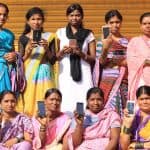It’s Global Health: Nobody Said It Was Going to Be Easy
These are disheartening times for those who expect the U.S. to be a leader – the leader – in global health.
The Trump White House is considering budget cuts that could impact all sorts of life-saving interventions in developing countries. There’s talk of the U.S. walking away from, or somehow renegotiating, the Paris climate accord – even though climate change has a direct impact on health, especially for the poor. And Trump, a vaccine skeptic, this week fired Surgeon General Vivek H. Murthy, a vocal supporter of childhood vaccines. The anti-vaxxers are making a comeback.
At a more basic level, the U.S. itself is currently mired in a debate – at least inside the Washington, D.C., beltway – that the rest of the world seems to have settled years ago. Will the free market, if left alone, provide the best possible health care for all? Lots of Republicans seem to think so, even though that notion has been debunked all over the globe, even by many who revere the free market. (Remember the EpiPen?) Meanwhile, Gavi, PATH and other respected global health experts have been addressing market inefficiencies for years, in an attempt to give poor people access to decent health care that they would never otherwise receive.
Add to the mix concerns over how Brexit might impact the amount of money and effort Britain puts into helping developing countries … and what might happen should France elect right-wing candidate Marine Le Pen – described as a protectionist – as president on May 7.
It’s a lot to take in, and when NextBillion designated April as our Health Care Month, we didn’t anticipate any of it. But we’re glad we made that decision. In the middle of all these seismic political events, it’s been enlightening to hear from a variety of health care providers, the very people most impacted by the recent goings-on. Are they preoccupied with all the governmental wrangling? Distracted by the nationalism that seems to be taking root? The takeaway seems to be an emphatic “no.” Changing political priorities seem to be just another obstacle to overcome on the long road to making the planet healthier.
Vanessa Kerry, the younger of former U.S. Secretary of State John Kerry’s two daughters, has been talking and hearing about politics around the dinner table her entire life; her father’s worked in public service for decades. She helped put things in perspective in a Q&A that centered on Seed Global Health, her novel public-private partnership designed to address the shortage of health professionals in emerging economies: “People have to come before politics. There are far too many women, men, adolescents and children dying from preventable and treatable conditions in every part of the globe,” she said. “Public health is an endeavor far greater than any nation’s individual interests or borders, and we hope that even amid global political challenges, we will see increased investment in a sector that can keep everyone healthy, safe and more secure.”
She’s focused and realistic, with a touch of optimism. Those were necessary traits for anyone working in the global health sector before all the recent elections, and they’ll remain key after the next ones.
Speaking of being realistic, how’s this sober prediction from Dr. Jane Aronson, CEO of the Worldwide Orphans Foundation: “The world is overpopulated and migration is a way of life now and will be probably for hundreds of years. The issues of conflict and war will increase and that will actually stimulate more migration, unfortunately; migration away from rural communities to urban settings. It will change the way we live. We have to learn how to live better together.”
It’s enough to convince you we’re using the term “public servant” incorrectly, as it pertains to this discussion. Are the true public servants the politicians putting together deals in front of microphones and in pursuit of votes, or the global health problem-solvers putting together partnerships behind the scenes – like Orbis International and Akhand Jyoti Eye Hospital – to help the planet’s most vulnerable people? Maybe it’s overly simplistic to think of it in those terms; then again, maybe it’s just that simple.
If nothing else, Health Care Month renewed our appreciation for people whose first thoughts go to healing others and alleviating poverty: people who are rethinking how health care is segmented; how it’s organized; how successes can scale; how social enterprises not only remain relevant, but crucial.
A lot of us see that billions of people around the world are sick, including a large percentage who suffer from preventable diseases, and we get depressed. We rationalize it as inevitable. Those who work in global health see it as an outrage and set about fixing it, often at great personal cost. They’re a special breed, and we’ve been especially honored to help tell their stories this past month.
Kyle Poplin is the editor of NextBillion Health Care.
Photo courtesy of ccPixs.com, via Flickr
- Categories
- Health Care



